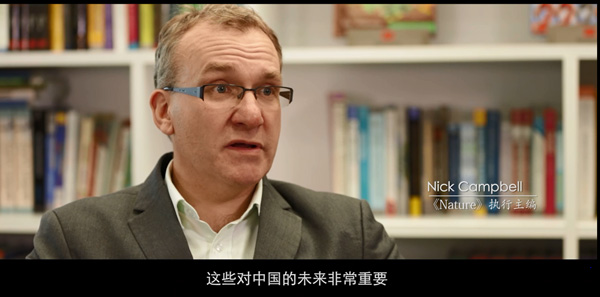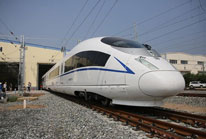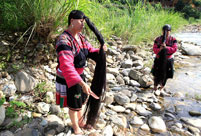


Nick Campbell, Executive Editor of Nature, a prominent scientific journal, hailed China’s scientific development in recent years as “incredible” in an interview with thepaper.cn.
Campbell said this assessment is based not just on the rising number of papers being published in China (China is now the second largest producer of publications according to the Science Citation Index) but also on the fact that China is leading the world in growth of high-quality scientific output.
The Nature Index 2015 China, published as a supplement to Nature on Dec. 17, 2015, shows that China's total contribution to emerging science has risen to become second largest in the world, surpassed only by the United States.
According to Campbell, Chinese pharmaceutical chemist Tu Youyou’s Nobel Prize win in Medicine on Oct. 5, 2015 was a milestone in Chinese scientific achievement. Although the studies for which Tu was recognized date back to the 1970s, the victory is nevertheless an undeniable acknowledgement of the innovative and high-quality scientific achievements of China, he said.
Campbell noted that since China established an evaluation system focusing on SCI publishing for scientific research, the country has successfully broken away from a tradition of domestic competition. In doing so, China has gained a more international perspective.
However, Campbell also mentioned that scientific institutions across the globe are working on more diverse assessment systems, which cover factors such as the economic benefits and social impact of research. He cited as an example the U.K.’s “Evaluation of the Research Excellence Framework,” proposed in 2014, which maintains a special focus on the social impact of research.
In the interview, Campbell proposed that Chinese scientific institutions diversify their modes of funding instead of relying solely on government allocations. For instance, he suggested, institutions could consider taking funds from medical companies and charities. He also recommended that Chinese scientific institutions and companies cooperate more closely in order to foster innovation.
 World's fastest bullet train to start operating next month
World's fastest bullet train to start operating next month Huangluo: China's 'long hair village'
Huangluo: China's 'long hair village' Spectacular bridge with one of the tallest piers in the world
Spectacular bridge with one of the tallest piers in the world Magnificent view of Hukou Waterfall
Magnificent view of Hukou Waterfall A glimpse of Stride 2016 Zhurihe B military drill
A glimpse of Stride 2016 Zhurihe B military drill US Navy chief tours Liaoning aircraft carrier
US Navy chief tours Liaoning aircraft carrier Chinese American woman wins Miss Michigan
Chinese American woman wins Miss Michigan Centenarian couple takes first wedding photos
Centenarian couple takes first wedding photos Traditional Tibetan costumes presented during fashion show
Traditional Tibetan costumes presented during fashion show Top 10 livable Chinese cities
Top 10 livable Chinese cities Top 20 hottest women in the world in 2014
Top 20 hottest women in the world in 2014 Top 10 hardest languages to learn
Top 10 hardest languages to learn China’s Top 10 Unique Bridges, Highways and Roads
China’s Top 10 Unique Bridges, Highways and Roads Sino-US ties will be shaped by interactions
Sino-US ties will be shaped by interactions Human remains, pottery found in China's 4-millennia Dongzhao Ruins
Human remains, pottery found in China's 4-millennia Dongzhao Ruins Olympic team charms HK
Olympic team charms HK Teenagers left traumatized by ‘electroshock therapy’
Teenagers left traumatized by ‘electroshock therapy’Day|Week